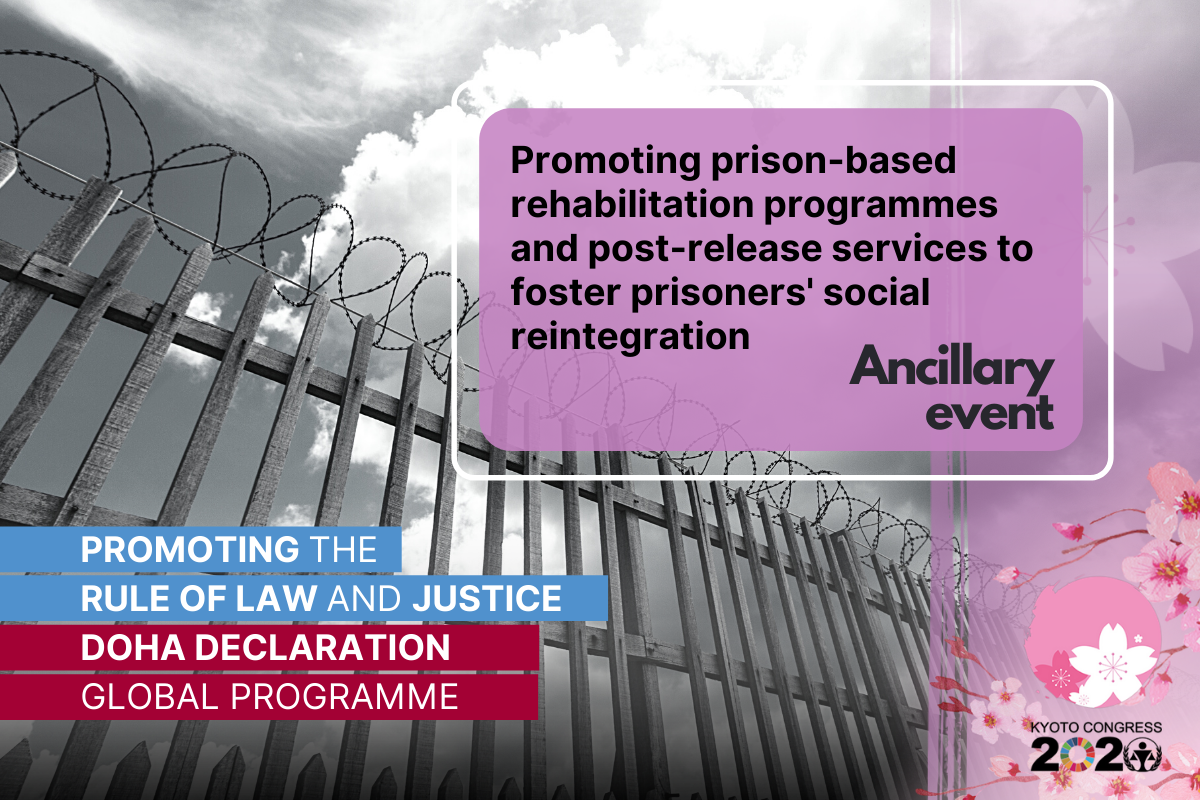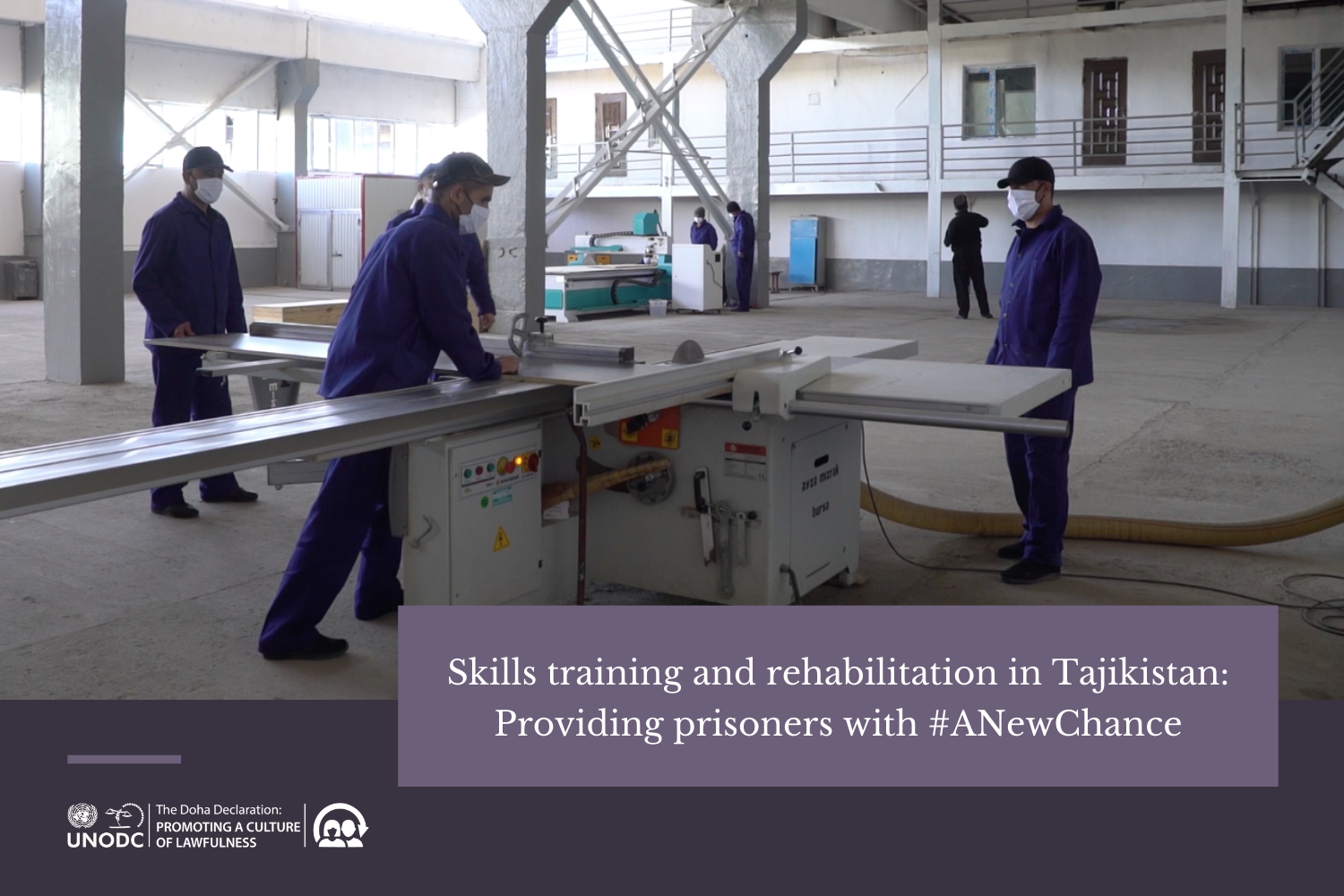A new chance for prisoners to mend their future, one stitch at a time
14 June 2018 - Since the adoption of the Standard Minimum Rules for the Treatment of Prisoners at the first United Nations Congress on Crime Prevention and Criminal Justice (Crime Congress), held in Geneva in 1955, UNODC has always advocated for the rehabilitation of prisoners and their social reintegration, a recurrent topic in subsequent Crime Congresses, and particularly during the revision and update of the minimum rules adopted unanimously by the UN General Assembly in December 2015. The revised Rules became known as the 'Nelson Mandela Rules' to honour the legacy of the late President of South Africa. The Doha Declaration, adopted at the 13 th Crime Congress in April 2015, recalls the importance of supporting the rehabilitation and reintegration of prisoners into society, recognizing the investment into corresponding programmes as one of the best and most cost-effective way of preventing prisoners from re-offending.
In its commitment to advancing the rule of law, criminal justice and crime prevention, UNODC has been working on the rehabilitation of prisoners, and reducing the possibility of recidivism by investing in their future and changing their outlook on life. Thus, in Member States' penitentiary facilities around the globe, programmes to rehabilitate detainees, rather than merely punish them, are being implemented with the guidance and direct support of UNODC, through various measures outlined in manuals such as the Roadmap for the Development of Prison-based Rehabilitation Programmes, published under the Global Programme for the Implementation of the Doha Declaration.
Such educational, vocational training and work schemes programmes, including training in a variety of sectors such as crafts, construction, fashion and more positively affect prisoners' behaviour and attitude, giving them a purpose as they serve time. Moreover, they also impart viable skills and qualifications for them to apply outside of jail, enabling them to redirect their path upon liberation and secure a better future.
|
One such programme has outdone even its initial expectations, not only rehabilitating female prisoners in Panama, but also turning their work into sellable, and potentially profitable products. Since its inception and launch in 2016, IntegrArte has developed and commercialized a range of prisoner-made quality products of artistic and functional value. By providing new perspectives of social reintegration through training, motivation and teamwork, it has demonstrated that prisoner rehabilitation is feasible, beneficial and advisable.
To appreciate the impact of the programme on the lives of the prisoners in question, and consequently on the outlook for their successful reintegration in society, several participants in the sewing programme were interviewed; their testimonies, which they were happy to share publicly, point to the enormous benefits that adopting this forward-looking, affirmative approach can bring all involved parties.
A common denominator in the responses of participants was gratitude for the overall initiative. Diana, in her third year of incarceration, described it: "What a beautiful experience, thinking that we didn't know there would be more opportunities in our lives, something which would mark us, something which would be worth it, and it turned out that the opportunity came as we were deprived of our freedom."
It is clear that the programme brings more cohesion and camaraderie amongst detainees, improving interpersonal relations while they learned new skill sets. As Monica commented, "we are all united here; here I feel calm, liberated, I don't feel pressure, and if I have a problem we talk about it, we are a family."
Working together also gives the inmates a sense of normalcy, of a constructive daily routine. Claudia, who herself trained fellow detainees on the machines, explained: "Above all, being here is like an escape from reality; it makes our lives normal, gives us something every day, makes us feel as if we were free."
The togetherness and the motivational factors were important for all the women interviewed on their assessment of the programme, and the psychological effects proved to be as valuable as the practical ones. For Claudia, this was more important than eventual profitability: "We don't work for money, we work for our freedom. This motivates me, makes us feel good." Doris also spoke of self-improvement, saying she regained confidence in herself by participating in a fashion show they had organized, walking proudly to model the clothes made by her fellow inmates. "I hope they give this opportunity to more inmates. My friends saw me and saw how much I changed, and now they want to participate and to be given another opportunity. If I could change, they can too," she insisted.
Of course, the technical skills were the crucial elementary factor making prisoners feel empowered. As Monica commented, "I learned to use the sewing machine thanks to Claudia and I can now sew shirts, and I can do anything they give me. It is a very nice experience." In fact, most of the women who participated in the rehabilitation programme said they were keen to carry its benefits forward by sharing what they learned with others. As Karen put it, "in addition to being a blessing from God, the IntegrArte workshop has been an opportunity to acquire knowledge which we will take with us when we are free, and which we will be able to teach others."
Satisfaction in their work on a personal level also translated in a sense of pride in their collective achievements. "I know these products are so good that people want them and have taken note of them," said Diana. "Leaving a seed here will be something for me to remember with my family, with my daughters, so that they can be proud of something good I did and which erased the errors and the mistakes I made before. This is what IntegrArte has been for me."
IntegrArte is one of several rehabilitation initiatives which UNODC supports around the world. Specifically as part of the Global Programme for the Implementation of the Doha Declaration, the organization is assisting Tajikistan to enable the training and employment of male inmates in metalworking and furniture manufacture; supporting multi-purpose vocational training facilities in Zambia and Kyrgyzstan, allowing inmates to work in food production and clothes manufacturing; and, in accordance with its commitment to spreading gender equality, helping boost the initiative "Building Freedom" in Bolivia, which will train female inmates in the field of construction.
More projects are in the pipeline, from Indonesia and Nepal, to Tunisia and the State of Palestine, always with a view to help prisoners' reintegration into society and reduce the possibility of recidivism.
Additional information:


